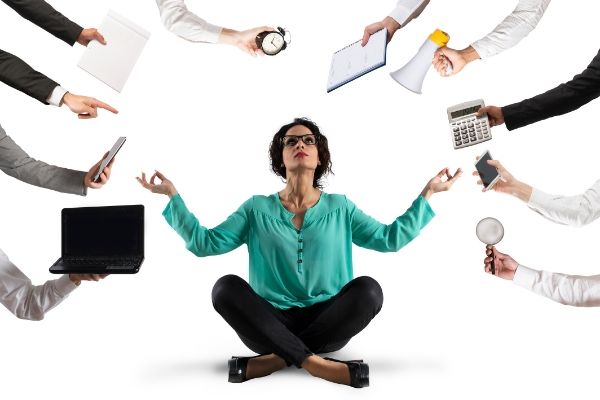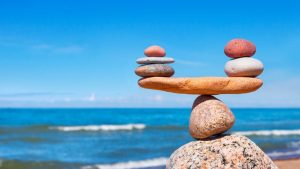Why should people with migraine use relaxation?
People with migraine [1] often identify stress as a headache trigger. Many studies have examined the relationship between stress and migraine. Some researchers suggest there is a “bidirectional relationship” between stress and migraine. In other words, stress can contribute to a migraine and having migraines can be a source of stress. Some researchers have proposed that daily hassles (and not major life events) are the most potent sources of stress for people with migraine. An abrupt reduction in stress (like what happens after the end of a work week) can also be the source of let-down headaches.

Although there are many unanswered questions about the linkages between stress and migraine, research does support the effectiveness of relaxation in countering both the effects of stress and migraines.
I don’t feel anxious, but I am very busy…is this stress as well?
Stress can mean different things. Some people use the word stress to talk about anxiety and worry. The undertone of this is that the person may have excessive concerns about things that might not happen. This can be managed with psychotherapy [2] but also meditation [3].
In cardiology, stress is used to talk about the load on the heart pump, or how much power the heart has to use to push blood through our system. If you see your brain as a machine, you can imagine situations where more power is needed, or energy is low: lack of sleep, many decisions to make, many tasks to do at the same time. Some people refer to this as the mental load, even if the person is not anxious. Mental exhaustion is also a trigger for migraine.

How can relaxation decrease the mental load?
Relaxation techniques can decrease the load on the brain. Thoughts are put on the side, the focus is on the present, on the breath, on an image or on body sensations. We do not know yet the exact mechanisms that lead to less migraines with regular meditation techniques, but benefits are demonstrated.

What techniques can be used to manage stress and mental exhaustion?
Different techniques have been studied:
- Progressive muscle relaxation (PMR)
- Biofeedback (to read more click here [4])
- Mindfulness meditation
- Diaphragmatic breathing
- Guided visual imagery
How often should I practice relaxation to get results?
A regular practice is key. Relaxation seems to work best if it’s done on a daily basis. It has to become a «maintenance practice» for your brain. For people with let-down headaches, daily relaxation can help keep stress levels down and potentially avert a headache when the stressful period ends. Each session does not have to be very long, regularity is more important. The decision to make space for meditation in your life can be empowering.
How does relaxation work to improve migraine?
During the stress response, the body’s sympathetic nervous system causes several changes: increases in muscle tension, heart rate, blood pressure, breathing rate, and perspiration. In contrast, the relaxation response brings the body in a resting state: the heart rate and blood pressure decrease, the breathing slows and deepens, and muscle tension decreases. Bringing the body into a relaxed state seems to have positive effects on migraine frequency.
How can I get started?
Read our post on HOW to use relaxation for migraine management! [5]
REFERENCES
Buse DC & Lipton RB (2015). Primary headache: What’s stress got to do with it? Cephalalgia 35(10): 844-849.
Fuerst, ML (2014) Relaxation followed by stress triggers migraine. Modern Medicine Network.
Lipton et al. (2014). Reduction in perceived stress as a migraine trigger: testing the “let-down-headache” hypothesis. Neurology 82(16): 1395-401.
Rains JC, Penzien DB, McCrory DC, Gray RN (2005). Behavioral headache treatment: history, review of the empirical literature, and method critique. Headache 45 Suppl 2: S92-109.
Sauro K & Becker WJ (2009). The stress and migraine interaction. Headache 49(9): 1378-86.
Smitherman TA, Wells, RE, Ford SG (2015). Emerging behavioural treatments for migraine. Curr. Pain Headache Rep. 19(4): 13. Doi: 10.1007/511916-015-0486-2
Post#713
